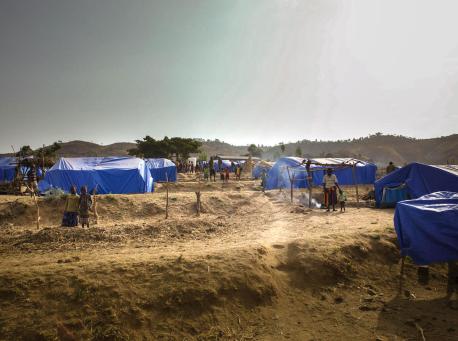
Displaced by Violence in Ethiopia: A 9-Year-Old's Story
For 9-year-old Gabezech, home for now is a blue tent among many arranged high on a hillside in southwestern Ethiopia.
The camp where she now lives is one of six set up for IDPs — short for internally displaced persons — in Ethiopia's Konso Zone in the Southern Nations, Nationalities and People region. The camps, supported by UNICEF, were set up to house the roughly 84,000 people who were forced out of their homes over land disputes in late 2020. Tens of thousands of children have been uprooted, many separated from their families, leaving them at greater risk of disease, struggling to find shelter and more vulnerable to violence.
In the village of Kusume, an estimated 10,000 people, including Gabezech and her family, were left homeless after residents of a neighboring village set fire to their houses. "I didn't see the fire, I only saw the smoke," Gabezech says. "We walked a long way to get here ... I was carried. I was tired. There were many people who lost their homes in the fires, just like us."
UNICEF is working to improve the dire conditions in the often overcrowded IDP sites, where malnutrition and diseases like diarrhea, pneumonia, scabies and eye infections are common and the only water source is a nearby stream. UNICEF is supplying families with water treatment tablets to prevent diarrhea, a leading cause of death among children under 5.
Two schools in Kusume were damaged in the violence. COVID-19 had already caused massive disruption to children's education in Ethiopia; a combination of violence and the pandemic means that many children have been out of school for more than a year.
"I love to learn," Gabezech says wistfully. "I was in Grade Zero."
UNICEF is working with partners around the world to protect children from the impact of violence, poverty and the COVID-19 pandemic. You can help.
Read more about how lack of access to safe water threatens the lives of children growing up in conflict zones, and what UNICEF is doing to provide critical water, sanitation and hygiene services.
Top photo: Gelabo IPD Camp in Ethiopia's Konzo Zone is one of six set up to house families displaced by violence in the region. © UNICEF/UN0420380/Tesfaye. Video by Tong Su for UNICEF USA.
HOW TO HELP
There are many ways to make a difference
War, famine, poverty, natural disasters — threats to the world's children keep coming. But UNICEF won't stop working to keep children healthy and safe.
UNICEF works in over 190 countries and territories — more places than any other children's organization. UNICEF has the world's largest humanitarian warehouse and, when disaster strikes, can get supplies almost anywhere within 72 hours. Constantly innovating, always advocating for a better world for children, UNICEF works to ensure that every child can grow up healthy, educated, protected and respected.
Would you like to help give all children the opportunity to reach their full potential? There are many ways to get involved.



